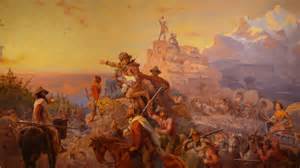Manifest Destiny was the idea that the Americans who colonized the Eastern Seaboard, won the Revolutionary War and the War of 1812, and took advantage of the Louisiana Purchase were following a preordained path when they expanded further westward, all the way to the West Coast of North America. The term itself was first used in print by New York editor John L. O'Sullivan, in an article urging support for the annexation of Texas. The article, titled "Annexation," appeared in the July-August 1845 edition of the United States Magazine and Democratic Review. In particular, O'Sullivan wrote, that it was America's "manifest destiny to overspread the continent allotted by Providence for the free development of our yearly multiplying millions."
The belief of O'Sullivan and others was that Americans were following a path laid out for them by Providence, or God, in pursuing westward expansion. Another tenet of Manifest Destiny was a nearly religious fervor for spreading the ideas behind the democratic-republican government and proponent of individual liberty that the United States had become. Whatever the driver, the term became a commonly used one, more and more often used a synonym for westward expansion. The term Manifest Destiny took on political overtones. In the mid 1800s, the American political scene was very much a two-party struggle, between the Democrats and the Whigs. Democratic President James K. Polk drove the annexation of Texas, and others in his political party thought the same way as Polk did. The Whig Party, by contrast, was suspicious of expansion that was too rapid. When the Whig Party gave rise to the Republican Party, the struggle continued and also morphed into North vs. South, with both sides of each divide trying to claim that right was on their side in the further expansion (or not) of American settlement. Standing in the way of this westward expansion, of course, were the hundreds of Native American tribes living in the Midwest and West. The U.S. repeatedly signed treaties with tribes, giving up money for land, and then broke those treaties, taking back the money in many cases. It was not an uncommon belief at the time that white Europeans were superior to nonwhite Native Americans (and African-Americans). This thinking drove settlers onward and westward, in pursuit of what they thought was their right (and, in some cases, duty) to fulfill their destiny. The term made a bit of a comeback at the end of the 19th Century, in rhetoric in support of the Spanish-American War. Usage then wasn't so much about expansion from coast to coast as it was of standing on the world stage. |
|
Social Studies for Kids
copyright 2002–2026
David White

 The United States annexed Texas and won the consequent
The United States annexed Texas and won the consequent 
